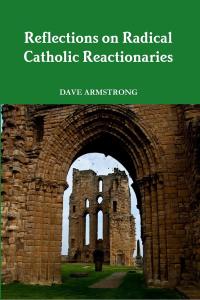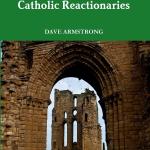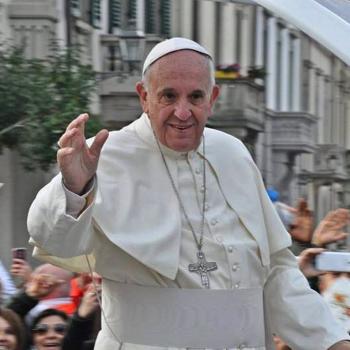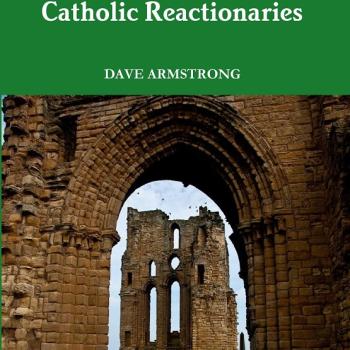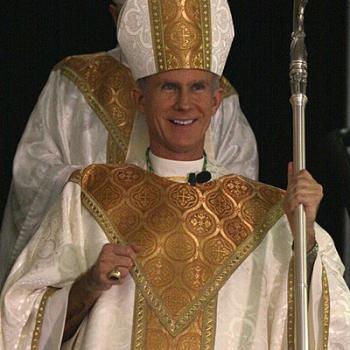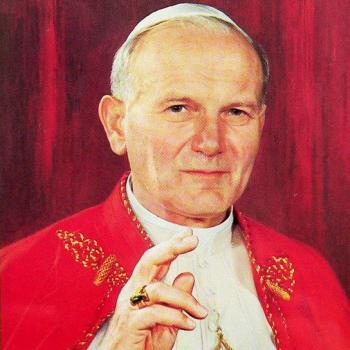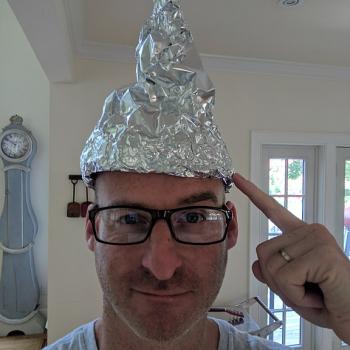Chapter 4 (pp. 37-43) of my book, Reflections on Radical Catholic Reactionaries (December 2002; revised second edition: 17 August 2013; slightly revised again in November 2023 for the purpose of the free online version). Anyone who reads this book should first read the following three introductory articles, in order to fully understand the definitions and sociological categories I am employing:
Introduction (on the book page)
Definitions: Radical Catholic Reactionaries, Mainstream “Traditionalists,” and Supposed “Neo-Catholics” [revised 8-6-13]
Radical Catholic Reactionaries: What They Are Not [9-28-21]
If you’re still confused and unclear as to my meanings and intent after that, read one or more of these articles:
Rationales for My Self-Coined Term, “Radical Catholic Reactionaries” [8-6-13]
My Coined Term, “Radical Catholic Reactionary”: Clarifications [10-5-17]
Clarifying My Coined Term, “Radical Catholic Reactionary” [4-3-20]
This book is modeled after the method and structure of the French mathematician and Catholic apologist Blaise Pascal’s classic, Pensées (“thoughts”). Catholic apologist and philosopher Peter Kreeft described this masterpiece as “raw pearls” and “more like ‘sayings’ than a book . . . ‘Sayings’ reflect and approximate the higher, the mode of Christ and Socrates and Buddha. That’s why Socrates is the greatest philosopher, according to St. Thomas (S.T. III, 42, 4).”
*****
- Radical Catholic reactionaries contend that “conservative” Catholics deny the modernist crisis by pretending it doesn’t exist, or by rationalizing and justifying it. Of course, orthodox Catholics who know much at all about the state of the Church in practice don’t deny that there is a crisis. The orthodox difference with the reactionary position lies in the cause and precise nature of the crisis. We don’t locate its primary cause in Vatican II and post-1958 popes (supposedly “modernist” or “ambiguous,” etc., etc.), or the New Mass. We place it where it belongs: on the shoulders of heterodox modernists who have worked to undermine traditional orthodoxy and piety — whether in sincerity, or according to a diabolical plan to destroy the Church (which is, of course, impossible to do — Matthew 16:18).
- Conservative implies that there is a legitimate liberal option within Catholicism, which is absolutely untrue. One either accepts the teaching of the Church in toto, or else one has adopted the Protestant principle of authority (private judgment and supremacy of the individual over the Church).
- “Conservative Catholics” do not – as their critics assert — fail to look for the root causes of the present crisis, and delude themselves in thinking that a revival is in the germinating stage. The heretical tendency has always been with us. It has never subverted or perverted any Catholic doctrine, because God wouldn’t allow that to happen. Reactionaries disagree? Then they should take up their argument with God Himself, and Holy Scripture.
- There are a host of causes for the present crisis in the Church, going back to Protestantism (even elements of the Renaissance and the earlier nominalism), the “Enlightenment,” materialistic evolutionism, the utopian ideal of Progress, massive secularization, Marxism, philosophical relativism, political and theological liberalism, the sexual and feminist and unisex revolutions, idolatrous wealth and all the myriad temptations of modern American life, the disintegration of the family, the incessant propaganda and brainwashing of TV and movies and advertising, lack of education and catechesis, etc. All these cultural and intellectual fads and fashions infiltrate Catholics as individuals, but they cannot penetrate the fortress of Catholic dogma or ecclesiological structure. If such were possible, certainly we would have had by now (at the very least) permitted contraception and abortion and divorce, female priests, married priests in the Latin Rites, openly homosexual priests (as with the Anglicans), a denial of the dogma of transubstantiation, process theology, liberation theology, a demotion of the papacy, etc.
- “Conservative Catholics” supposedly are (wrongheadedly) more concerned with reactionaries (those on the far “right”) than with modernists, Protestants, cultists, and agnostics (those on the “left”). As a Catholic apologist, I have far, far more material on my website (especially including links) and books about these other groups than about reactionaries. I dare say that this is the case for virtually all Catholic apologists I am aware of. Virtually all of my papers are written with Protestants in the back of my mind (how to persuade them to convert to Catholicism). I have treated reactionaryism at length because the amount of error and self-contradiction to be found in it is enormous and harmful to souls — and because it masquerades itself as the only “pure” form of Catholicism (analogous to the Protestant fundamentalists). I have a web page on radical Catholic reactionaries, but I also have one for the various heresies, and for theological liberalism (and atheism as well).
- A reactionary told me that “conservative Catholics” must “mature” or grow into (what he called) the “traditionalist” position; and that dialogue and disputation would not bring this about: only contemplation could do so. Why, then, did Paul “argue” and “dispute” and “reason” with Jews and Greeks, if this is true? Why did Jesus debate the Pharisees? Why did St. Thomas Aquinas write his masterwork in a question-and-answer, back-and-forth, premise and objection form? Why did he debate the Muslims? Why did St. Augustine debate the Manichees and Donatists, and St. Justin Martyr, the Jews? Why did Cardinal Newman debate Mr. Kingsley (thus giving us his masterpiece Apologia pro vita Sua)? And why pit debate against contemplation? This is simply one more ploy to avoid constructive dialogue — in so doing the reactionaries who think like this have bought into yet another modernist (and “religious fundamentalist”) error: the sneering at reason as a means to truth. We are simply supposed to shut up and “listen” to the never-ending doom-and-gloom monologues and jeremiads against the Church. How did this become a one-way street? Who said that the reactionaries were the teachers and we were the students? Who anointed them?
- I and other orthodox Catholics need to “mature” into the reactionary position? I “matured” into Catholicism from Protestantism, but that didn’t happen by reading books up in a tree house somewhere. I did read many books, but it was the dozens of hours of vigorous discussion with my friends, and then reading Newman’s Essay on Development (itself an extended argument against the Anglican version of Church history), and vigorous arguments against contraception and the Protestant Revolution that convinced me — quite the opposite of this contention that dialogue and debate doesn’t change anyone. I had to be “unconvinced” of my former positions, not just “convinced” by reading something different, as if I were Muhammed receiving the Koran out of heaven, with no argument, no questions asked; no mental or rational process. I’ll take the reason, logic, philosophy, and apologetics of Aquinas, Augustine, Jesus, Paul, Newman, Pascal, Jerome, Bossuet, Bellarmine, Chesterton, Francis de Sales, Knox et al, any day, if the choice is between this group and reactionary contemplation, to the exclusion of rational scrutiny.
- Reactionary logic is curiously and fatally self-contradictory, ironically exhibiting many of the same characteristics that it claims to decry in theological modernism and Protestantism, and in what it denigrates and despises as a compromised, so-called “conservative” Catholicism, allegedly in cahoots with (or at the least, blind to) the attempted modernist / liberal / “progressive” crisis that has rocked the Church in recent years. This self-contradiction and strong tendency towards the “slippery slope” is one reason why reactionaryism — by its own admission — suffers from the never-ending internal splits and conflicts typical of all schismatic and sectarian and heretical movements that operate on the false principle of private judgment. Thus any given reactionary will severely criticize movements to their “right” – such as sedevacantism – while not seeing that their own underlying principles, premises, and presuppositions lead inexorably to such “further out” conclusions which are more consistent and coherent (albeit more distant from orthodoxy) than their own.
- I find it extremely humorous and ironic that I am now — in effect — accused of being a quasi-modernist for simply defending the pope’s supreme and preeminent authority. Yet those who undermine it by cafeteria-like selectivity and an imprudent appeal to conscience (a la Luther) are supposedly the true Guardians of Catholic tradition! Papal supremacy dies the death of a thousand qualifications at the hands of reactionaries. What better way to undermine papal authority than this? Incrementalism . . . Satan’s ploy.
- The schismatic mindset condemns anyone to the “left” of them as “conservative” Catholics, inherently compromised by association with the modernists, by their very nature. I know spiritual elitism when I see it, and it stinks. I used to observe that all the time as a Protestant. The Reformed / Calvinists thought they were the true legatees of the “Reformation heritage” and that other Protestants were intrinsically compromised and inferior. Certain charismatics thought they were of a higher category because of the “baptism of the Holy Spirit.” The name-it-claim-it crowd thought they were the elite amongst the charismatics. The fundamentalists thought they were the greatest thing since sliced bread and that all others were flaming liberals. Now reactionaries think they are the only totally orthodox and “true blue” Catholics, while they go around knocking the pope, the New Mass, and Vatican II. Truth is stranger than fiction, isn’t it?
- G. K. Chesterton:
People have fallen into a foolish habit of speaking of orthodoxy as something heavy, humdrum, and safe. There never was anything so perilous or so exciting as orthodoxy. It was sanity: and to be sane is more dramatic than to be mad . . . The orthodox Church never took the tame course or accepted the conventions; the orthodox Church was never respectable . . . It is easy to be a madman: it is easy to be a heretic. It is always easy to let the age have its head; the difficult thing is to keep one’s own. It is always easy to be a modernist; as it is easy to be a snob . . . It is always simple to fall; there are an infinity of angles at which one falls, only one at which one stands. To have fallen into any one of the fads from Gnosticism to Christian Science would indeed have been obvious and tame. But to avoid them all has been one whirling adventure; and in my vision the heavenly chariot flies thundering through the ages, the dull heresies sprawling and prostrate, the wild truth reeling but erect. (Orthodoxy, Garden City, New York: Doubleday Image, 1908, 100-101)
- G. K. Chesterton:
The Church is from the first a thing holding its own position and point of view, quite apart from the accidents and anarchies of its age. That is why it deals blows impartially right and left, at the pessimism of the Manichean or the optimism of the Pelagian. It was not a Manichean movement because it was not a movement at all. It was not an official fashion because it was not a fashion at all. It was something that could coincide with movements and fashions, could control them and could survive them. (The Everlasting Man, Garden City, New York: Doubleday Image, 1925, 228)
- No one is denying the crisis. It’s the interpretation of it and its causes and cures, and the prognosis for the future that are in dispute.
- A reactionary told me that if I want to win over reactionaries, that it was advisable to emphasize my “sympathy with them over the crisis.” We already do (they just don’t know it). But beyond that, one doesn’t pull someone out of a pit of despair or lack of faith or adoption of various false principles of epistemology and Christian authority by getting down in the pit with them. Grown-ups ought to be able to withstand a critique of their view, and be able to compare two visions side-by-side and decide for themselves which is more sensible, plausible, true, consistent, and Catholic. The mutual derision of liberalism is quite enough commonality. I’m quite as unhappy and disdainful about liberalism as any reactionary is. I utterly detest and despise and loathe it: and I felt the same, even as a Protestant.
- Orthodox Catholics say that the liberals are on their way out, like dinosaurs. Reactionaries, on the other hand, seem to think they are almost triumphant, having allegedly infiltrated and co-opted a council and the mind of a very influential pope (Pope St. John Paul II). That is a major difference; orthodox Catholics are far more optimistic than reactionaries are.
- We so-called “conservatives” don’t have to make a false dichotomy between tradition and the current leadership of the Church. We believe the Holy Spirit can preserve the Church, no matter who is in charge of it. As Malcolm Muggeridge and others have observed: seeing the sort of people who have often been in charge of the Church, this is a strong indication of the Divine Hand. That’s not to say that we think Pope St. John Paul II is a bad pope – not at all – rather, it is an observation about the lack of faith of the reactionaries, who do think that Pope St. John Paul II is doing great harm, and that God lets it happen and does nothing to protect His Church. That view is ludicrous, from a Catholic standpoint.
Related Reading
Neo-Catholic (Silly Radical Catholic Reactionary Term) [4-21-05]
Objections to the Reactionary Epithet Neo-Catholic [3-9-07]
Debate: Am I a Neo-Catholic? (Defined as Theological Liberal / Progressive / Enabler of Modernism) [vs. Mr. X] [6-11-14]
Dialogue: Meaning of “Neo-Catholic” (w Phillip Campbell) [11-27-20]
*
*****
*
*
Summary: Chapter 4 (pp. 37-43) of my book, Reflections on Radical Catholic Reactionaries (December 2002; revised in November 2023 for the free online version).


